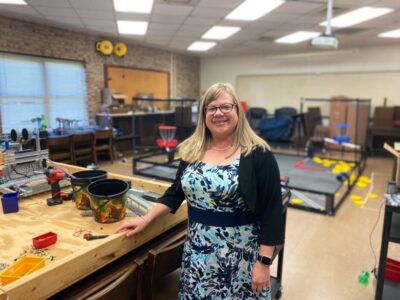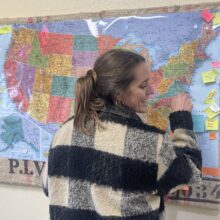Behind the Story
In this series, we are visiting the classrooms of this year’s Burroughs Wellcome Fund (BWF) Career and Science award winners. All 2023 recipients are in the western North Carolina district and will receive $175,000 for their schools. We visited the four winners over three days, documenting classroom activity and asking each educator the same questions. Our conversation below has been edited for length and clarity.
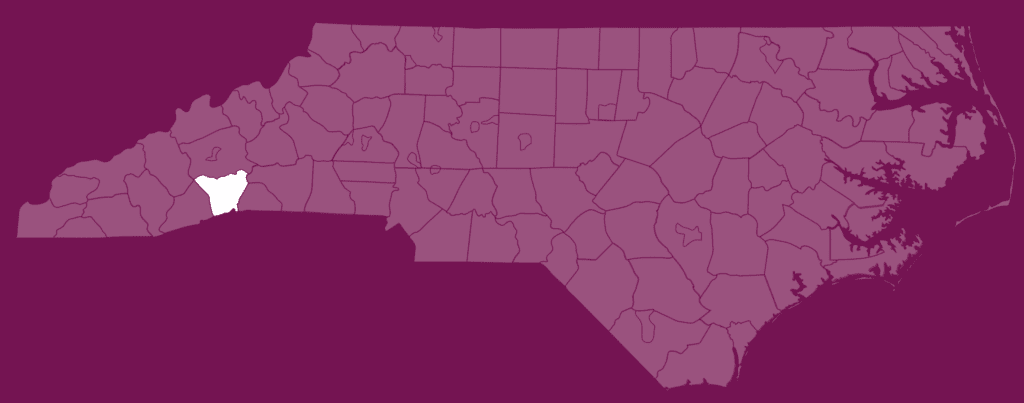
When Tom Savage was a kid, he use to slide in the snow near his Massachusetts house, next to a monument. The landmark Savage was sledding around signified the very spot where Robert Goddard, the father of American rocketry, launched the first liquid-fueled rocket.
His interest in science was sparked at an early age while playing in that snow. Savage would look up and wonder, who is that guy?
Many miles south of that launch scene in Auburn, Massachusetts, Savage now stands in front of his Henderson County Early College chemistry class and poses to them the question of the day. While junior Carly Milanese works on detecting the acidity of red cabbage in a variety of sauces and liquids, we ask what makes Savage a special teacher.
“He makes it more exciting with the stories he tells about his different past experiences. He just makes science fun, he does.”
Carly Milanese, junior at Henderson Early College
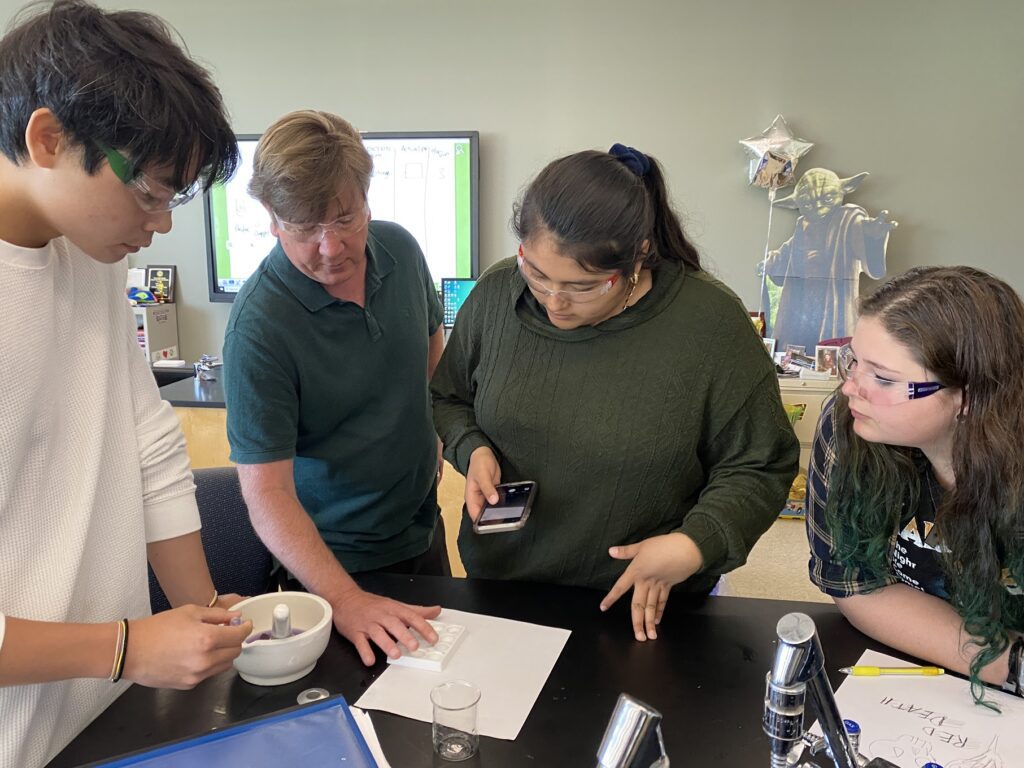
“I always knew I wanted to become a science teacher. But when I first got out of college, I wasn’t really quite ready for it,” Savage said.
Right out of school, he spent six years in the National Park Service. He divvied it up with two years in Glacier National Park out in Montana, two at Acadia National Park in Maine, and then two years at the Grand Canyon.
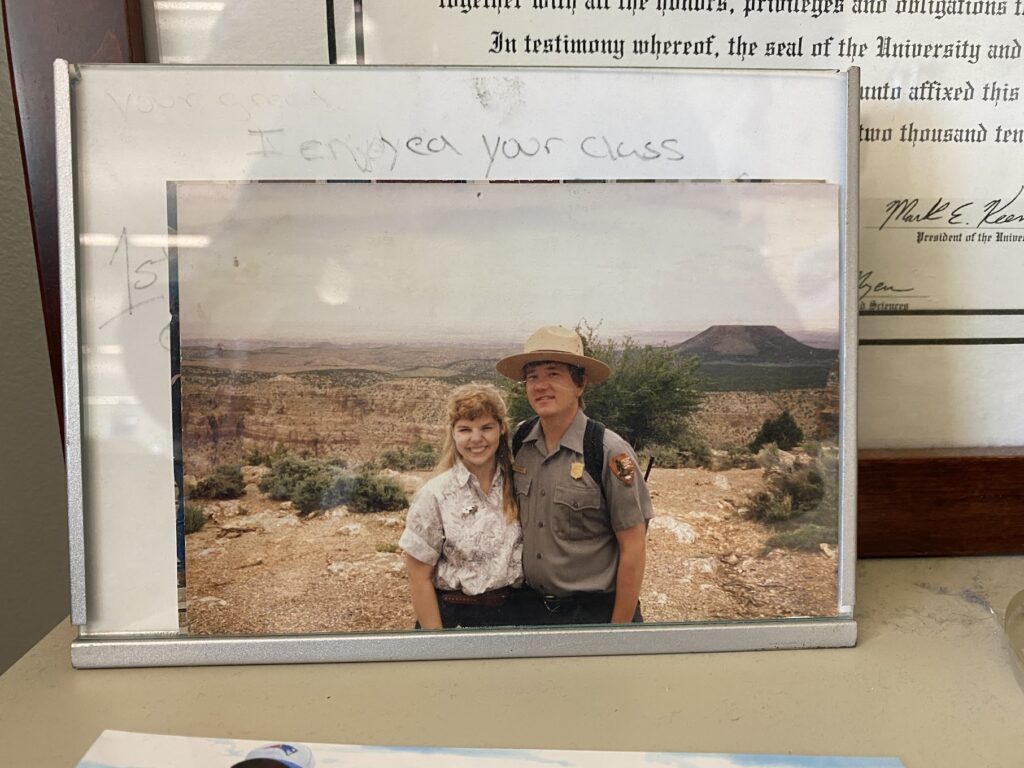
As a park ranger, he also worked in outdoor education for visitors. His wife was from Henderson County, and he transferred to the Carl Sandburg Home National Historic Site to be closer to her. When he got here, he became more serious about being an educator.
He has been a science educator for 19 years now and has taught at the Early College since they opened their doors in 2009. He coaches the Science Olympiad team, the MIT Invention team, and coordinates a district-wide elementary outreach effort called “Young Scientist.”
He won the BWF 2023 Career and Science award and will be expanding and deepening this outreach work, getting students excited about science at an early age, just like he was.
EdNC: When did you know you loved science or what made you love science?
Savage: Both my parents were in science fields. My dad was a pharmacist, and I worked in his pharmacy. I didn’t really understand as a kid what he did much except that he made medicine. And my mom also worked for the Worcester Foundation. They inspired me as a young kid and would order these TIME life books, like almost encyclopedias, but they weren’t an encyclopedia, they were very small books. One would be on fossils and one would be on weather, things like that. And they never forced it on me, they just put it on my desk. And every month, we’d always get that monthly book in the mail that I’d always look forward to. And I loved looking at the pictures. So that coupled with a couple of science teachers in middle school, that brought science to life. Instead of just telling us, they were having us do science.
EdNC: What educator made the biggest impact on you and why?
Savage: My college professor in undergraduate school was probably the biggest pivotal person. He encouraged me during my sophomore year when I showed interest in geology to think beyond the school, beyond the books, and said, why don’t you apply to a national park and interpret the geology there? He knew my personality, I followed his advice, and I did exactly that. So that led to six years of traveling the country and really getting a better skill, building my toolbox so to speak, to teach science later on.
EdNC: Of all the things you do in class, what do you think makes the greatest impact on students?
Savage: I think tying in what we’re currently studying with careers can make a great impact and getting students to realize that there’s so many different opportunities out there. Just yesterday, I was talking to my chemistry students about all these metals that haven’t been fully discovered yet, or different alloys and metals that are best used in the aerospace industry.
Trying to tie that in, so that they can actually see it is another way. For instance, I tried to get them involved with glass and ceramics and use candy as a model for them to fully see it. So we’ll melt a little bit of candy, and then they’ll start stretching it, and then I’ll start telling them this is exactly how glass is formed, they got to heat it up and stretch it out. One of my dreams to capture the imagination of these students is I want to take them to the glass center in Asheville. There they can go in and literally blow their own drinking glass and choose their own colors. And have them see this is not food coloring, but it’s salts like calcium chloride or iron, different elements make these different glasses different colors.
EdNC: Looking forward, what do you think will engage future generations in science?
Savage: I think keeping the kids engaged and learning what’s around them in our own community. In all of my science classes, I’m always trying to find local things that are occurring. In the last couple of years, we have had to cancel school because of flooding. It was always snow, never flooding. Well, the last couple years, it’s been rain and flooding.
And so in a lot of my classes, we teach them about overdevelopment and floodplains. Being very careful with planning in your own backyard. How can you be a better citizen of our community?
And I think through those smaller projects, they then begin to see the big picture globally, that we’re all in this together. And that science is important, especially going through this last pandemic. It was a great lesson, and I told my students going into the pandemic when we’re all going home, science is going to come to the rescue, and it sure did with the vaccine.
Project: Creating district wide ‘Young Scientists’
In Henderson County Public Schools, Savage will use his award money to enhance existing science curriculum at 10 local elementary schools. Working with two schools a year, together they will identify the greatest needs to get students engaged in science. Assistance will come in the way of new science equipment, a mentorship program involving Savage’s students, both current and past, STEM nights, and support to send teachers to science conferences.
He has already spoken with the first two schools, one of which will be focusing on interactive science in their backyard. They will use the creek behind the school, receive microscopes, and start discovering life in the water. They are also purchasing infrared cameras that students will be able to take home and put in their own backyard to report what they see.
The second school is installing a remote weather system station on the outside of the classroom. Students will have the ability to communicate with the instruments via bluetooth, recording wind speed, barometric pressure, and temperature.
Both schools are focusing on the science right outside their windows, in their own backyards.
Editor’s note: The Burroughs Wellcome Fund supports the work of EducationNC.
Recommended reading
